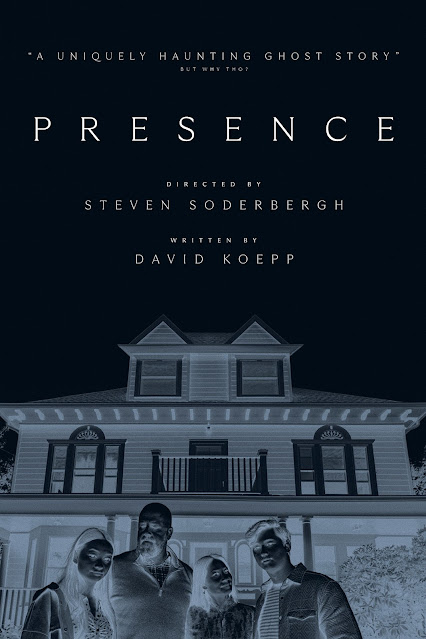Steven Soderbergh’s Presence is not just a ghost story—it’s a deeply personal, introspective, and stylistically daring supernatural thriller that stands out for its bold use of perspective and moral depth. Shot entirely from the first-person point of view of a spirit, the film immerses the viewer into the consciousness of an unseen entity navigating a family’s domestic unraveling. It’s not only a technical experiment, but a story with emotional weight, subtle revelations, and a chilling undercurrent of tragedy.
Premiering at the 2024 Sundance Film Festival and released by Neon in early 2025, Presence has become a sleeper hit, earning $10.5 million on a modest $2 million budget. Directed, shot, and edited by Soderbergh, with a script from veteran screenwriter David Koepp, the film offers an experience that is simultaneously eerie, emotionally nuanced, and structurally inventive.
From the very first frame, Presence makes its unique perspective clear. The camera doesn’t merely observe—it is the titular presence. As viewers, we are not passive spectators; we are the entity. The opening moments feature a silent glide through a vacant house, establishing the ethereal atmosphere before the arrival of the Payne family. Julia Fox plays the sharp-tongued real estate agent Cece, who ushers the family into their new home, unknowingly introducing them to a tenant who never left.
The Payne family is ripe for psychological unspooling. Rebekah (Lucy Liu) is a cold and calculating executive who shows little emotional availability to her children. Her husband Chris (Chris Sullivan) is more nurturing, but increasingly weighed down by his wife’s moral ambiguity and emotional distance. Their son Tyler (Eddy Maday) is brash and entitled, mirroring Rebekah’s worst traits. The emotional anchor of the film, however, is daughter Chloe (Callina Liang), a quietly grieving teen still reeling from the death of her best friend Nadia. Chloe is also the first to acknowledge the Presence—not with fear, but a calm acceptance, suggesting a sensitivity that others in the household lack.
As the story unfolds, Presence gradually reveals layers of its mystery. What begins as a familiar haunted house scenario slowly morphs into a meditation on the interconnectedness of trauma, family dysfunction, and spiritual reckoning. The film deftly blends ghost story tropes with psychological drama, as Chloe senses the Presence organizing her things or shielding her from harmful situations. Other visitors—painters, mediums, and friends—encounter or dismiss the supernatural in varying ways, adding to the mystery.
Though some subplots—such as Rebekah’s corporate misdeeds or her crumbling marriage—are only touched upon, they help create a broader moral context for the haunting. The film subtly suggests that the Presence is not just an observer, but an agent—one struggling with its own identity, its ties to the family, and a lingering sense of responsibility.
One of the film’s strengths is how it builds dread not through jump scares, but through the growing awareness of danger, especially in Chloe’s increasingly manipulative and sinister relationship with Ryan (West Mulholland). What begins as typical teen romance shifts into a disturbing subplot involving drugs, control, and ultimately, violence. It’s in these scenes where Presence transcends the genre and becomes something more visceral—a cry for justice from beyond the grave.
Steven Soderbergh’s presence behind the camera is just as integral as the characters in front of it. As the operator of the first-person camera, Soderbergh essentially performs the spirit’s role, imbuing the camera’s movements with curiosity, fear, frustration, and ultimately, purpose. The effect is more than immersive; it’s deeply empathetic. We are the ghost, and we learn as it learns.
This style could have easily become a gimmick, but in Soderbergh’s hands, it becomes a sophisticated narrative device. The camera lingers on reflections, hesitates at doorways, and reacts emotionally to scenes—sometimes retreating in grief, other times hurtling toward a character in rage or urgency. The use of perspective aligns the audience with the Presence’s emotional arc, creating a connection far stronger than traditional ghost stories allow.
By the film’s end, the mystery of the Presence’s identity is solved in devastating fashion: it was Tyler all along. His violent death at the hands of Ryan, while heroically saving his sister, retroactively reshapes the film’s emotional foundation. What initially seemed like haunting becomes mourning; what felt like observation turns into redemption. Tyler, once the most abrasive family member, dies confronting his own capacity for change. His posthumous journey—marked by protection, remorse, and final transcendence—becomes the film’s moral core.
The reveal isn’t treated like a twist, but more like a curtain slowly drawn back. Rebekah’s final confrontation with Tyler’s ghost in a mirror is heartbreakingly human, and Soderbergh doesn’t milk the moment for spectacle. Instead, he allows it to land softly, quietly, like the lifting of a burden.
Presence is less about ghosts than it is about what haunts us: guilt, grief, moral ambiguity, and the fear that we may never be truly known—even by those closest to us. It is a story of second chances granted not in life, but in death. Soderbergh and Koepp use the supernatural as a mirror to human behavior, delivering a film that is both emotionally intimate and technically audacious.
While not every thread is given equal weight and some narrative transitions feel a bit abrupt, Presence succeeds where it matters most. It is a film that lingers—haunting in all the right ways. Its impact grows stronger the more one thinks about it, and on repeat viewings, its layered construction and spiritual resonance will likely become even clearer.
In a landscape saturated with horror films designed to shock and then be forgotten, Presence dares to ask deeper questions: What kind of imprint do we leave behind? Can we change, even after death? And who will carry our legacy—our light or our darkness?
This is not a movie about a haunted house. It’s a movie about haunted people. And in its final moments, when the Presence finally ascends, we’re left with something all too rare in supernatural cinema: peace.

